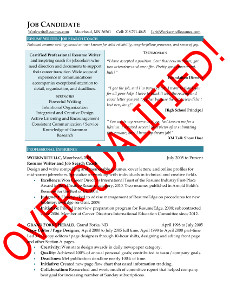
There are good reasons to apply for a position for which you are overqualified. Make sure your reason is one of them.
The quickest way to overcome the stigma of overqualification is to address it head on. There are ways you can do this in your resume, cover letter, and interview.
Resume
The biggest resume issue for “overqualified” candidates is including or omitting information. Sometimes, omitting information is termed “dumbing down” a resume. Personally, I find the label offensive, but you need to know what it means, in case you encounter it.
I prefer to stay with the philosophy that guides my resume writing regardless of the issue of overqualification: Fit the resume to the requirements of the position.
For example, a clinical psychologist has had a wide and varied career. She has worked as a school psychologist, had a thriving private practice in which she has done many assessments for corporations, and has given many keynote addresses at conferences and association gatherings. She is five years from retirement and wants to scale back to only the assessment part of her practice.
The big question in her mind is, “What do I include on my resume?”
The short answer is only the parts of her career that pertain to assessments. She must find job descriptions of those positions for which she is seeking and match her resume to those requirements. A company seeking a psychologist to give assessments to job candidates doesn’t necessarily care that she spent 20 years as a public speaker or 30 years in the public school system. They want to know if she can give assessments that will help them make hiring decisions.
The question to answer is “How will this information help a hiring manager decide I am a good fit for his / her position?”
Cover Letter
The cover letter reveals a different quandary for an overqualified candidate. If you establish your fit for the position in your resume, you need only give an example of your experience and achievements in your cover letter. Often a bullet list will do this most efficiently.
For a candidate concerned about being overqualified, the more salient point is why the candidate would be seeking a lesser position. If you don’t explain, a hiring manager may assume you didn’t read the job description well or that you are applying for jobs indiscriminately. Either way, your application may get tossed out without consideration.
(Legitimate reasons for a downward step in your career appear in a previous post.)
In a brief paragraph in your cover letter, explain your motivation for your career path. If you choose to reassure the hiring manager of your continuing dedication to your industry, do that with examples rather than statements about your high level of commitment. For instance, you could mention a recent certification or a new responsibility you’ve taken on that demonstrates continuing interest in staying current in your field. For pre-retirement candidates, mentioning your technological proficiency can help dispel worries that you won’t know how to operate the computer.
Interview
Questions in an interview for a candidate who appears overqualified can take a strange turn. Hiring managers will have paradoxical concerns:
- Will you become bored quickly with less responsibility and leave?
- Will you be able to handle the technology?
- Will you get along with younger, less experienced co-workers and managers?
- Will your manager be intimidated by you?
- Will you be “manageable”?
(A more comprehensive list of concerns appears in a previous post.)
Remember, your reasons for directing your career downward may seem perfectly clear and logical to you. A hiring manager will probably need more reassurance. Be prepared by anticipating and answering questions in your resume, cover letter, and interview
If you have made the decision to step back in your career and are encountering difficulties in landing a suitable position, contact me right away, so we can talk about how we might work together to align your search with your goals.
Related
Overqualified: Why take a position when you’re overqualified?








